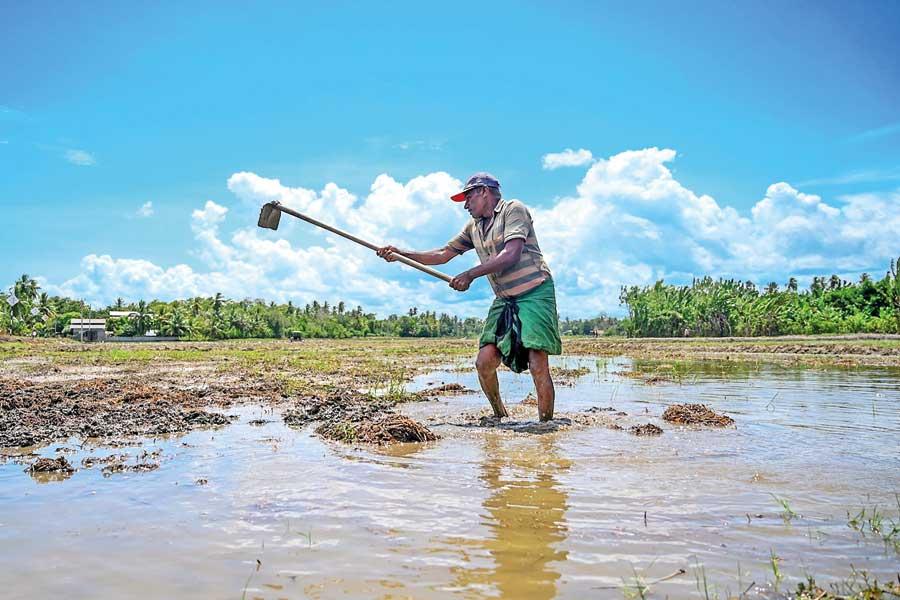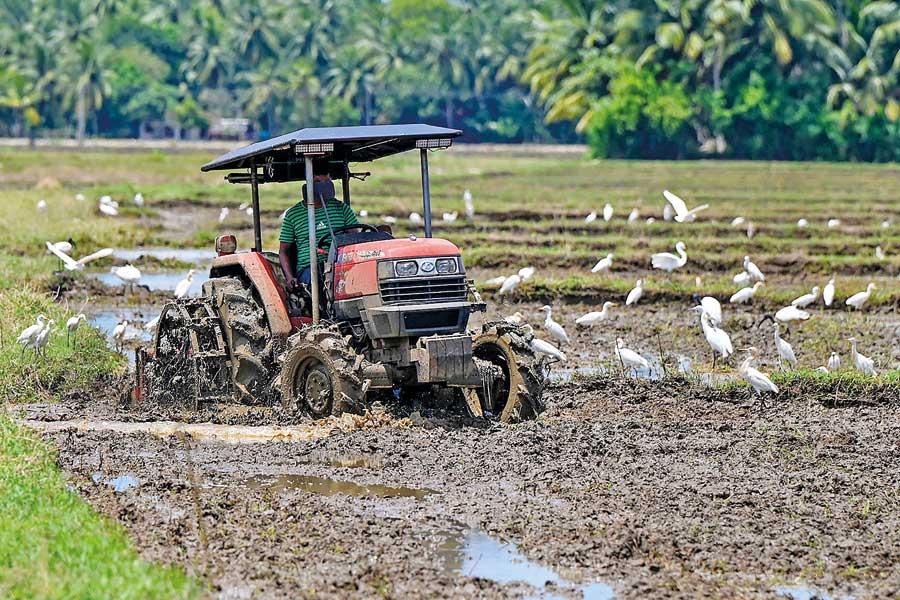
“Therefore, despite what the President, the Prime Minister or any Minister have to say, a famine seems unlikely to occur next year. But there might be a severe food shortage. If there is a food shortage in the country, the government will be held accountable. This shows the incompetence of the government. We repeatedly pointed out that Sri Lanka is in the grip of an unprecedented hunger crisis. For that, we need to implement a cultivation war to create food security.
Sri Lanka ranks fourth among countries with the highest food price inflation while having the sixth-highest rate of malnutrition among children in the world and the second highest rate in Asia.
K. B. Gunaratne pointed out that Sri Lanka must gear to cultivate the Maha season successfully.
Farmers are getting ready for the Maha season. But the government is not ready yet. Releasing water for the Maha season should begin by October 20. According to Gunaratne by now, farmers should be given fertilizer. “But the farmers have not received the fertilizer yet as the Government does not have a proper plan.
When the fertilizer needed for the Maha season is not supplied on time, the expected harvest cannot be obtained. Therefore, a shortage of food is to be expected next year. The misdoings of the officials and politicians are to blame. Officials trick politicians and in return politicians trick people or both parties trick the people. After the water is released and the cultivation starts, urea will be needed in every two, four and six weeks. But the tender to import the urea needed for the Maha season was signed and approval was given on October 14. It will take more than two months for the stock of urea to arrive in the country,” he added. According to Gunaratne when the fertilizer required for cultivation is not available it is not possible to get the expected harvest; hence a food shortage is imminent. Farmers are expecting to cultivate 8.5 million hectares this Maha season, but they are yet to receive fertilizer. Therefore, the expected harvest during the Maha season will be determined by the fertilizer this time, according to Gunaratne.
This food crisis will be present during December and January. Failing to obtain a proper harvest in the Yala season the government imported rice, which was almost inedible. Therefore, its consequences were not noticed. But if we do not receive the harvest of the Maha season by February and March, there will be a food shortage again, according to Gunaratne. Taking the present situation into consideration it is doubtful whether a good harvest can be obtained during the Maha season because it will take another two months to import urea. “If we had implemented a cultivation war in the first place, these problems would not have occurred. Fertilizers needed for the Yala season were brought 2-3 weeks prior to obtaining the harvest. Therefore the Yala harvest decreased. At least they did not give the money allocated to purchase paddy for the Yala season let alone fertilizer. In such a background, we cannot believe that fertilizer will be provided for the Maha season. According to Gunaratne the government has no plan for that,” said Gunaratne.
The current president is not down to earth when commenting. He has no knowledge of agriculture. If there is a food shortage in the country, the government will be held accountable. This shows the incompetence of the government. We repeatedly pointed out that Sri Lanka is in the grip of an unprecedented hunger crisis
Agriculture Minister Mahinda Amaraweera said that 176 cwt of urea would be provided per hectare for the Maha season. The question is whether it is possible to do so. There is no indication that the paddy harvest during this Maha Season would be as expected by the government. In the meantime, farmers are in more trouble due to the new taxes imposed by the government.
Taxes have been imposed secretly targeting farmers’ income. A farmer cultivating in the dry zone receives 5500-6500 kilos of paddy per hectare. Estimating that to be 6000 and if that figure is multiplied by 120 rupees the income a farmer receives is 720,000 rupees. When divided by six, the monthly income is 120,000 rupees. But the average yield in that region is 4,000 kilos of rice per hectare. Then the income is 480,000 rupees. When it is divided by six months, the monthly income is 80,000 rupees. With other incomes the monthly income is 100,000 rupees or more. But the quantity of paddy produced per hectare is roughly calculated as 4800 kg. Then the income is 576,000 rupees. When divided by six, it is 96,000 rupees per month. Together with other earnings the income is expected to exceed 100,000 rupees. This income is not mentioned anywhere. But the government can get information regarding this income secretly through Grama Niladhari officials, agriculture officials and Samurdhi officials. Then the farmer will also be subject to the 6% tax when he earns 100,000 rupees resulting farmers to pay the new tax imposed by the Government. In this manner, the government is trying to collect taxes from owners of small tea plantations, small rubber plantations and small coconut plantations and even fruit sellers. Due to taxes, farmers may even quit farming. This will further increase the risk of food crisis and we will be humiliated in front of the world, according to Gunaratne.
Our country is an agricultural country. “Agriculture contributed 23% to the gross domestic product. But today, the contribution of agriculture to the GDP is about 6.5-7 %. This situation has been created by us. A doctor, a professor and a monk tricked the former president into creating this situation. We were humiliated before the world because of the organic farming policy. The president went home after two and a half years. This situation arose because of attempting to implement impractical plans. That is why we need to take help from people who are knowledgeable in those areas. Then it will be possible to find remedies to malnutrition among children and food shortage,” Gunaratne added.“Api Vawamu Rata Nagamu’’ was the most successful agricultural programme implemented in the country. This programme was successfully implemented from 2007-2014. In 2010, the country became self-sufficient in rice. There was no need to import food items. In 2020, 4800 kilos of paddy were obtained from one hectare. It was a record. But all of that was destroyed with the organic farming decision taken on 29-04-2021. There is no country that has obtained 100% harvest from organic farming alone. There is no such cultivation. To cultivate successfully, chemical fertilizers must also be added.
The reason for the collapse of agriculture is the lack of an agricultural policy in the country. There is no practical, down-to-earth policy. There are only policies adopted by officials and politicians as they wished. If we want to uplift agriculture in this country, we only need ten policies. If farmers are provided with seeds, fertilizers and insecticides with a market, farmers will continue farming. “We have made these proposals. But they are yet to be implemented. Some people did not like to implement those proposals as they were greedy for commissions and positions. The agriculture of this country was destroyed by the politicians and officials,” Gunaratne added.
Maithripala Sirisena, as the Minister of Agriculture, implemented the programme, “Api Vawamu, Rata Nagamu” successfully. It was popular all over the country. Since ancient times we have had an opinion that Minister of Agriculture would become the Prime Minister of the country. Basil Rajapaksa feared this programme and changed Maithripala Sirisena’s subject ministry to health and took over the “Api Vawamu, Rata Nagamu” programme. Even today we need such planned programmes to find solutions to the food shortage issue,” Gunaratne added.
Chemical or organic fertilizers should be provided to farmers as soon as possible and plans should be made to cultivate during the Maha season successfully. It will not be possible to cultivate using 100% chemical fertilizers due to the severe economic difficulties
Chaminda Kankanamage Secretary Ceylon Eco Friendly Fertilizer Manufacturers Association
No response from Minister
We inquired from Agriculture Minister Mahinda Amaraweera about all the matters pointed out by Gunaratne. The minister couldn’t be contacted despite several attempts made by this newspaper. But recently the minister made the following statements to the media when he spoke about the fertilizer distribution planned for the Maha season.
“Accordingly the Department of Agriculture has recommended the supply of 176 kilos of urea per hectare to farmers cultivating paddy this Maha Season. During the previous Yala season, only 100 kilos of urea were provided per hectare. But for this season, the Department of Agriculture has recommended 70% chemical fertilizers usage and 30% organic fertilizer usage. The amount of urea provided for paddy cultivation has been increased by 76 kilos compared to the Yala season, according to the minister. In addition, farmers in farming colonies have been given 2 hectares of paddy lands each. Therefore, those farmers will get 352 kilos of urea, the minister added.
The best option
Ceylon Eco Friendly Fertilizer Manufacturers Association Secretary Chaminda Kankanamage said that the country is currently facing a severe fertilizer crisis. “Therefore, chemical or organic fertilizers should be provided to farmers as soon as possible and plans should be made to cultivate during the Maha season successfully. It will not be possible to cultivate using 100% chemical fertilizers due to the severe economic difficulties. Therefore, using 70% chemical fertilizers and 30% organic fertilizers as recommended by the Department of Agriculture is the best option. If possible, using 60% chemical fertilizers and 40% organic fertilizers will further help the country’s economy.
The government has given a subsidy of 20,000 rupees to organic fertilizer producers as an incentive to produce organic fertilizers during the Maha season. This time around the action taken by the government should be appreciated. Therefore, carrying out cultivation using a mixture of chemical fertilizers and organic fertilizers is better than using only one type of fertilizer,” he added.

Farmers are getting ready for the Maha season




